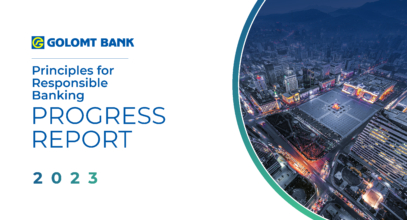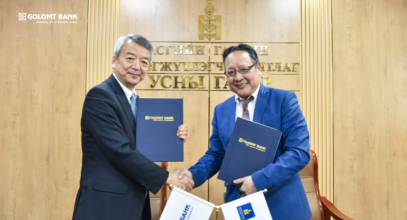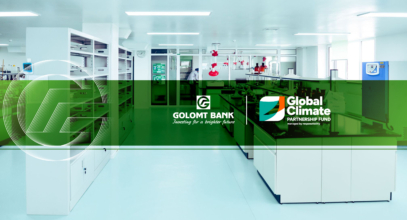
What is sustainable development?
Sustainable development means meeting the needs of the present without limiting the needs of the future
Signs of sustainable development
In addition to economic development, the efficient use of natural resources and the focus on health and social issues are signs of sustainable development.
Golomt Bank on September 22, 2019 in New York, USA, became one of the Founding Signatories of the Principles for Responsible Banking, committing to align strategically its business with the Sustainable Development Goals and the Paris Agreement on Climate Change.
Golomt Bank, by signing the Principles for Responsible Banking, joins a coalition of 130 banks worldwide, representing over USD 47 trillion in assets, in committing to taking on a crucial role in helping to achieve a sustainable future.

Golomt Bank is committed to advancing global and national sustainable development goals through responsible business practices. The bank provides financing for environmentally and socially sustainable initiatives, actively supporting its clients and the broader community in their transition to more sustainable practices.
- About the Sustainable Development Committee
Golomt Bank established its Sustainable Development Committee in 2022. The committee is responsible for overseeing and managing the implementation of the Bank’s sustainable financing and development strategy. It convenes at least two times annually to address both internal and external sustainability agenda. The CEO chairs the Committee, whereas the Sustainable Finance Department works as a secretariat.
- Sustainable Development Policy
Golomt Bank first adopted Sustainable Finance Policy in 2015. In 2019, we broadened the scope of the policy and upgraded into “Sustainable Development Policy” which outlines bank’s overall principles towards environment and society at all aspect of operations. Revised in 2024, it serves as a policy that defines the Bank's core principles and standards for its operations, as well as environmental and social risk management in its lending activities.
Golomt Banks Sustainable Development Policy aims to ensure that Golomt Bank consistently adheres to the concept of sustainable development, working in an environmentally friendly and socially beneficial manner at all levels of its operations.
Policy Accord;
• Mongolia’s “Principles for Sustainable Finance”
• Mongolia’s National Roadmap for Sustainable Finance
• UNEP FI’s “Principles for Responsible Banking”
• United Nations ”Collective Commitment to Climate Action”
• United Nations “Global Compact”
• United Nations “17 Sustainable Development Goals”
• United Nations Framework Convention on Climate Change (UNFCCC) Paris Agreement & Nationally Determined Contributions (NDCs)
• Sustainability Standards issued by the Sustainability Accounting Standards Board (SASB)
• “Vision 2050” Mongolia’s Long-Term Development Policy
• Kunming-Montreal Global Biodiversity Framework
• Mongolian Laws and Regulations
The policy establishes the bank’s commitment to the following principles:
• THE PRINCIPLES OF BEING HARMLESS TO THE ENVIRONMENT & SOCIETY
The Bank's activities, products and services, and internal operations take into account environmental and social implications, and they're in line with Mongolian laws and this policy.
• THE PRINCIPELS OF RESPECTING HUMAN RIGHTS & PROMOTING SOCIAL PROSPERITY
The Bank upholds the principle of human rights in all its internal operations and business activities, and adheres to international and national standards and guidelines pertaining to human rights and labor, such as the Universal Declaration of Human Rights, the 8 fundamental conventions of the International Labor Organization, the UN Global Compact, and the UN Guiding Principles on Business and Human Rights.
Work to prevent any violations of human rights, identify and take protective measures to protect them, and create opportunities for reparation of violated rights.
• THE PRINCIPLES OF PROTECTING CULTURAL HERITAGE
Any transactions or activities of the bank shall not adversely affect the unique cultural heritage, including customs, languages, and other heritage, as well as cultural, historical, archaeological, and paleontological monuments.
• THE PRINCIPLES OF SUPPORTING GREEN ECONOMY
The Bank will support business activities that avoid and reduce negative environmental impacts and enhance social prosperity, in accordance with Mongolian laws and regulations, international treaties and conventions.
• THE PRINCIPLES OF PROSPERING FINANCIAL INCLUSION
The Bank supports products and services targeting social groups with limited access to financial services, such as small and medium-sized enterprises, women, the elderly, and people with disabilities.
• THE PRINCIPLES OF SUPPORTING ETHICAL FINANCING & CORPORATE GOVERNANCE
The Bank will not provide financial support or services to any activity prohibited by national policy, will adhere to a zero-tolerance policy for criminal activities, and support activities such as combating money laundering and terrorist financing.
• THE PRINCIPLES OF FOSTERING TRANSPARENCY AND ACCOUNTABILITY
The Bank, while recognizing the need to ensure the confidentiality of customer information, will foster transparency and accountability, maintain accurate and transparent reporting of progress and results of operations in the field of sustainable development.
• THE PRINCIPLE OF LEADERSHIP
The Bank will be aware of its social responsibility and implement educational, health, social, environmentally friendly projects and programs aimed at employees and the public.
The bank's marketing and advertising will not violate human rights or gender equality, will not support any ideology or initiative that negatively impacts the environment, implement socially responsible policies aimed at the environment and society.
• ENVIRONMENTAL AND SOCIAL PRINCIPLES IN INTERNAL OPERATIONS
In accordance with Principle 8 of the Mongolian Principles for Sustainable Finance, the Bank will ensure that its internal operations comply with the environmental and social requirements set by its clients. The Bank will also strive to align its operations with the International Finance Corporation’s Performance Standards.
The direct impact of the Bank's operations on the environment, including the Bank's buildings, energy (fuel, electricity, etc.), resources (water, waste, procurement, etc.) consumption, and greenhouse gas emissions, will be measured and managed within the scope of the Bank's activities.
Integrate environmental and social risks when developing, approving, and implementing bank strategies.
Integrate climate change risks into the bank’s broader risk management framework. The bank will identify, assess and manage climate change risks on an equal footing with all other risk categories. This includes credit, market, operational, reputational, liquidity, business model and concentration risks.
In addition, the following policies will be adhered to throughout the Bank:
• The Human Resources Policy;
The Bank employees are provided with equal rights and opportunities.
The human resource activities, including employment, promotion, talent acquisition, lending, vacation, leave, assignment and training, shall promote human rights, freedom, health, safety, social well-being and gender equality. Employees shall have the right to contribute equally to and benefit from the bank’s operations.
• Training & Development Policy;
The Human Resources Division shall organize and fully involve employees in training in accordance with the sustainable development policy and other relevant documents. Employees shall also be responsible for implementing this policy including other relevant policies and procedures applicable to the Bank's operations.
• Marketing Policy;
The bank will actively promote the dissemination of information to the public regarding environmentally and socially responsible activities within the framework of social responsibility.
The Bank will implement relevant provisions of the Gender Equality Policy in its marketing activities.
• Environmental and social responsibility policy;
The Bank will support, initiate, implement, and collaborate on projects and programs in the following priority areas within the framework of social responsibility;
- Protecting nature and the environment;
- Promoting access to education, including public’s financial literacy;
- Promoting sports, arts, and heritage;
- Promoting public health;
• Environmental & social credit policy;
The bank will systematically identify, assess, and take measures to manage the potential environmental and social risks of all financings.
The Bank will conduct environmental and social risk assessments for business loans specified in the “Credit Operation Regulation”, “Environmental and Social Risk Assessment Regulation”, “Leasing Regulation”, and as required from investors and development financial institutions.
• Principles to follow on the financing;
The bank will consider environmental and social risks when making financing decisions and will finance loans if it deems the environmental and social risks are manageable.
The bank will require its clients to strengthen environmental and social risk management by imposing additional conditions onto the Credit Agreement, if deemed necessary.
The Bank will adopt a policy to support financing of sustainable and green lending activities, in accordance with the Mongolian Green Taxonomy, SDG Financing Taxonomy, and the Bank's "Sustainability Financing Framework", and the regulations and requirements of international investors and development financial institutions.
• Internal operations policy;
The Bank will focus on purchasing products and services that are energy efficient, have low greenhouse gas emissions, water efficient, and have no negative impact on human health, as indicated in the Sustainable Green Operations Standards.
Golomt Bank reviews the Policy annually and necessary changes are approved by the Executive Director. The responsibility for ensuring that the Policy is implemented and enforced across the Bank’s operations lies entirely with the Sustainable Finance Department and relevant departments within their respective areas of responsibility. The Bank’s Board of Directors (BoD) provides governance to ensure that the Bank’s operations are fully aligned with its mission, values and long-term objectives for sustainable development.
- About the Gender Equality Committee
The Gender Equality Committee was established in 2021 with an objective to promote gender equality internally within employees, and externally within customers through the Bank’s products and services. The Committee is comprised of C-level Executives and chaired by the CEO.
- Gender Equality Policy
The Golomt Bank has been implementing Gender Equality Policy since 2018 and is reviewed every two years.
The purpose of this policy is to define and regulate the legal basis for creating conditions for ensuring gender equality in all Golomt Bank activities, including marketing and procurement, product and service provision, and workplace and labour relationships.
Policy accord;
• The United Nations Sustainable Development Goals on Gender Equality;
• The Mongolian Law on Gender Equality & related acts;
• If the Mongolian law provides otherwise than international treaty, the provisions of the international treaty shall apply;
This policy is applicable to employees of the Bank. It also applies to the Bank's partners.
Structure of the Policy:
• Fundamental principles of gender equality;
• Method to ensure gender equality;
• Provisions prohibiting gender discrimination;
• Structure and system for ensuring gender equality;
Fundamental principles for ensuring gender equality:
• The Principles of Gender Equality
o Establish equal rights, equal opportunities, and equal treatment in daily interactions between employees and employers, as well as in the delivery of banking products and services, marketing, and procurement activities.
• Principle of Non-Discrimination
o Male and female employee and customer shall practice human rights and freedoms without discrimination or restriction, regardless of age, gender, job, position, opinion, marital status, educational differences, wealth, or sexual orientation.
• The Bank Responsibility Principle
o The Bank shall comply with relevant laws, regulations, and contractual obligations and assume responsibility for ensuring equality for male and female employees and customers.
• The Principle of Gender Information Accessibility
o Ensure transparency, openness, and accessibility of official statistical and other information disaggregated by gender.
The policy also defines the Bank’s obligations, rights and responsibilities of employees to ensure that employment policies and labor relations are free from gender discrimination and to ensure gender equality in the workplace. If employees witness or become aware of violations of the policy, they are encouraged to report them in accordance with the Bank’s “Whistleblowing Guidelines.”
- Environmental and Social Risk Assessment in the lending activities of the Golomt Bank
Golomt Bank, in 2015, introduced Sustainable Financing Policy and environmental and social risk assessment procedures into its lending activities.
Golomt Bank, in 2019, has revised its principles regarding environmental and social risk management and mitigation of environmental and social impacts in its “Credit Policy”. As a result, business loans that meet the following minimum features are required to have environmental and social (E&S) risk assessment. These include:
• All loan applications included in the “Caution list” in the Sustainable Finance Principles of Mongolia
• Business loan applications of high-risk sectors of E&S as outlined in the Mongolian Sustainable Finance Principles. These sectors include mining, energy, construction, agriculture, manufacturing /heavy manufacturing/, and chemicals and explosives /for use, sale and processing/ and fuel /storage, trade, production and transportation/.
• Other business loan requests more than MNT 100 million or equivalent.
Golomt Bank has developed a document-based assessment methodology in its updated E&S Risk Assessment, reflecting the International Finance Corporation (IFC) E&S risk management standard and Mongolian legislations and norms concerning the customer's economic sector. The Assessment is carried out in 3 stages: initial, general and detailed. In doing so, we manage the E&S risk for both the Bank and the customer by dividing the risk into five categories, ranging from low risk to high risk, depending on how the customer's activities impact the environment and society.
- Sustainable Green Standards
Golomt Bank has developed a "Sustainable Green Operations Standards" as part of its Sustainable Development Policy and has been implementing them since 2024.
The following groups of standards are detailed in this standard:
• Sustainable green procurement standards
Golomt Bank will adhere to sustainable and green standards in all potential procurement activities, and all units of the Bank are responsible for adhering to these standards. The implementation of these standards will be monitored, evaluated and supervised on a semi-annual basis.
• Sustainable green maintenance standards
The standard aims to gradually reduce the amount of all types of waste, either by developing a solid waste management program every five years, conducting a waste audit, or by sorting, storing, and disposing of 75 percent of waste according to a waste management plan. In addition, it includes air quality standards and measures to be taken during maintenance.
• Sustainable green cleaning standards
The main objective of this standard is to prevent and reduce the risk of exposure to hazardous chemical, biological, and particulate contaminants that may adversely affect the health and environment of Golomt Bank employees, customers, guests, partners and other entities.
• Smoke-free environment standards
By implementing this standard, a pleasant working environment will be created that does not negatively affect human health and has good indoor air quality in accordance with the international LEED green building standard.
The standard covers all types of cigarettes and e-cigarettes that pose a risk of secondhand smoke exposure and/or fire hazards, and includes areas where smoking is permitted and safety guidelines to be followed at those areas.
• Pest control standards
The purpose of the standard is to define common requirements for pest control in the interior and exterior areas of Golomt Bank offices, branches, settlement centers, and cash desks.
The standard specifies operational standards for pest control and pest management, and includes requirements to avoid using chemical pesticides as much as possible, use the least toxic pesticides, when necessary, maintain records, provide information to employees, use symbols, and solicit feedback.
These standards are followed by all units, officers and employees of the Golomt bank. Therefore, the Bank, by adhering to sustainable green operations standards in all its operations, is fulfilling its goal of leading by example in sustainable development, responsible practices with minimal negative impact on employees, customers, stakeholders, nature, society and the environment.
News
This website uses google analytics
This website uses information gathering tool which is Google analytic in order to determine the effectiveness of our online campaign in terms of sales and user activity on our sites.





